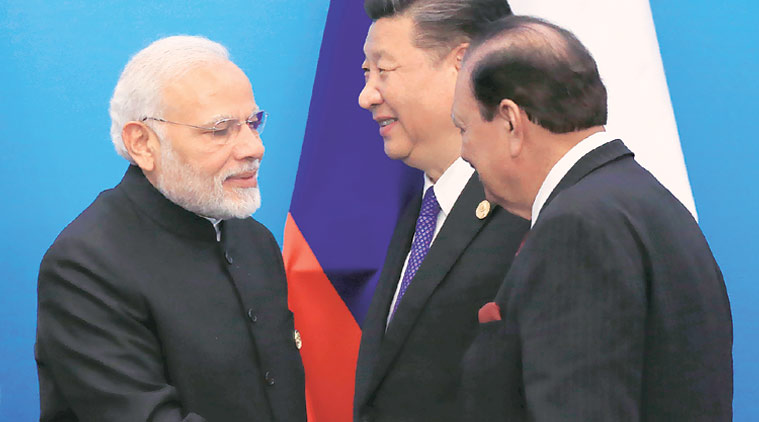Chanakya In Our Times
India’s use of his concepts of isolationism and involvement confounds Pakistan.

Prime Minister Narendra Modi with Pakistan President Mamnoon Hussain and China’s Xi Jinping at the signing ceremony of Shanghai Cooperation Organisation (SCO) in Qingdao, China. (Reuters Photo)
Pakistan’s last Field Marshal Ayub Khan’s posthumous book, Diaries of Field Marshal Mohammad Ayub Khan 1966-1972, had a significant entry: “Chanakya the Indian philosopher was also called Kautilya which means liar”. Khan’s moral judgment was not unlike early European reactions to Machiavelli who taught the princes of Europe how to rule their city-states. Pakistan should today read Machiavelli’s observations on the flaws of living inside a castle.
In From Chanakya to Modi: Evolution of India’s Foreign Policy (2017), Aparna Pande tries to explain India’s foreign policy in light of theories of the great Chanakya. According to Pande, India has alternated between two schools of thought, the Arthasastrins and the Dharmasastrins. The first recommends “artifice, infiltration, subversion, propaganda and economic pressure,” instead of war; the second advocates “heroic war for just ends, win or die”. Needless to say, the second sounds like the jihad doctrine of a revisionist Pakistan next door. But Kautilya had his famous Raj Mandala doctrine:
“In Kautilya’s concentric circles, your immediate neighbour is your natural enemy as he covets your territory and resources and is positioned to take them if he is more powerful than you. The neighbour’s neighbour, however, is your friend because he can covet your neighbour’s territory but cannot invade you until he becomes your neighbour. This identification of friends and potential rivals proceeds outward in mandalas or circles.”
Pande has described the development of foreign policy thinking in India in the light of the doctrines of isolationism and involvement. But, according to her, the two ways of thinking were not sealed from each other in the Indian mind. Chanakya’s Arthashastra casts its influence on Indian leaders from Jawaharlal Nehru to Narendra Modi.
The “cunning” implied in the doctrine is for the neighbours to deal with; in the Indian mind, it is relied on for avoidance of war. This difference of perceptions will continue to haunt South Asia that would see India’s pursuit of Raj Mandala as an evil double-faced approach. India’s well-known inability to reach quick bilateral decisions is also misinterpreted in the neighbourhood as well on the world stage. However, Pakistan has its own “doctrinal” difficulties with pragmatism and “flexibility of response” when dealing with India. Nobody in Islamabad has been able to decipher the statesman like Prime Minister Atal Bihari Vajpayee’s visit to Lahore in 1999. The unstudied consequence of that visit was the “conversion” of the then Prime Minister Nawaz Sharif, who rests unrepentant in prison today.
It is under Prime Minister Modi, however, that Raj Mandala has come into its own. He has hopped over “neighbour” Pakistan to invest in Afghanistan and Iran, tied up with a scared UAE and embraced a grateful Saudi Arabia while getting his most crucial high-tech imports from Israel.
Pakistan is fated to confront the Chanakyan approach to avoiding war. It lacks any cultural nexus with China. Pakistan therefore cannot understand its “all-weather” friend encircling India as if following the wisdom of Chanakya while at the same time doing big-time trade with India. While Islamabad agonises over Beijing’s advice to include India in the China-Pakistan Economic Corridor, it misses the signal from its all-weather friend.
Chanakya looks down and smiles.
The writer is consulting editor, Newsweek Pakistan.
For all the latest Opinion News, download Indian Express App
More From Khaled Ahmed
- Too Close To HomeNaipaul’s observations on South Asia are insulting, but may not all be off the mark..
- The Cast Of KargilMusharraf placed officers who shared his orientation on Kashmir in key positions...
- Consensual enslavementIslamic feminism has pushed back the women’s rights movement in Pakistan and reversed the movement for secularisation in the country..








































No hay comentarios:
Publicar un comentario